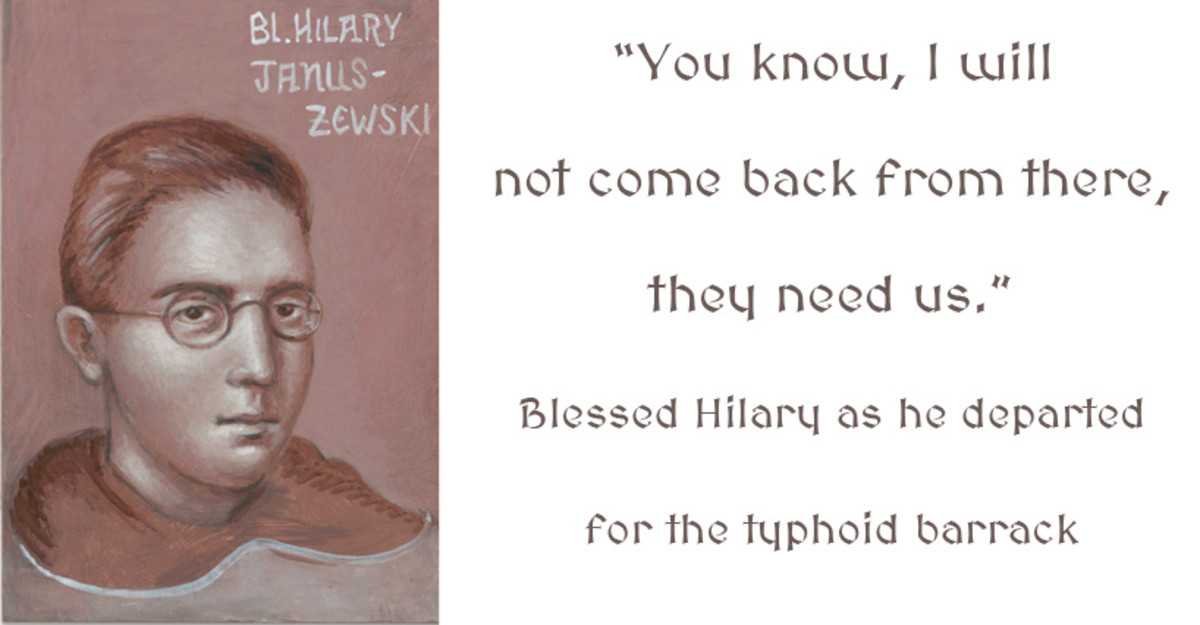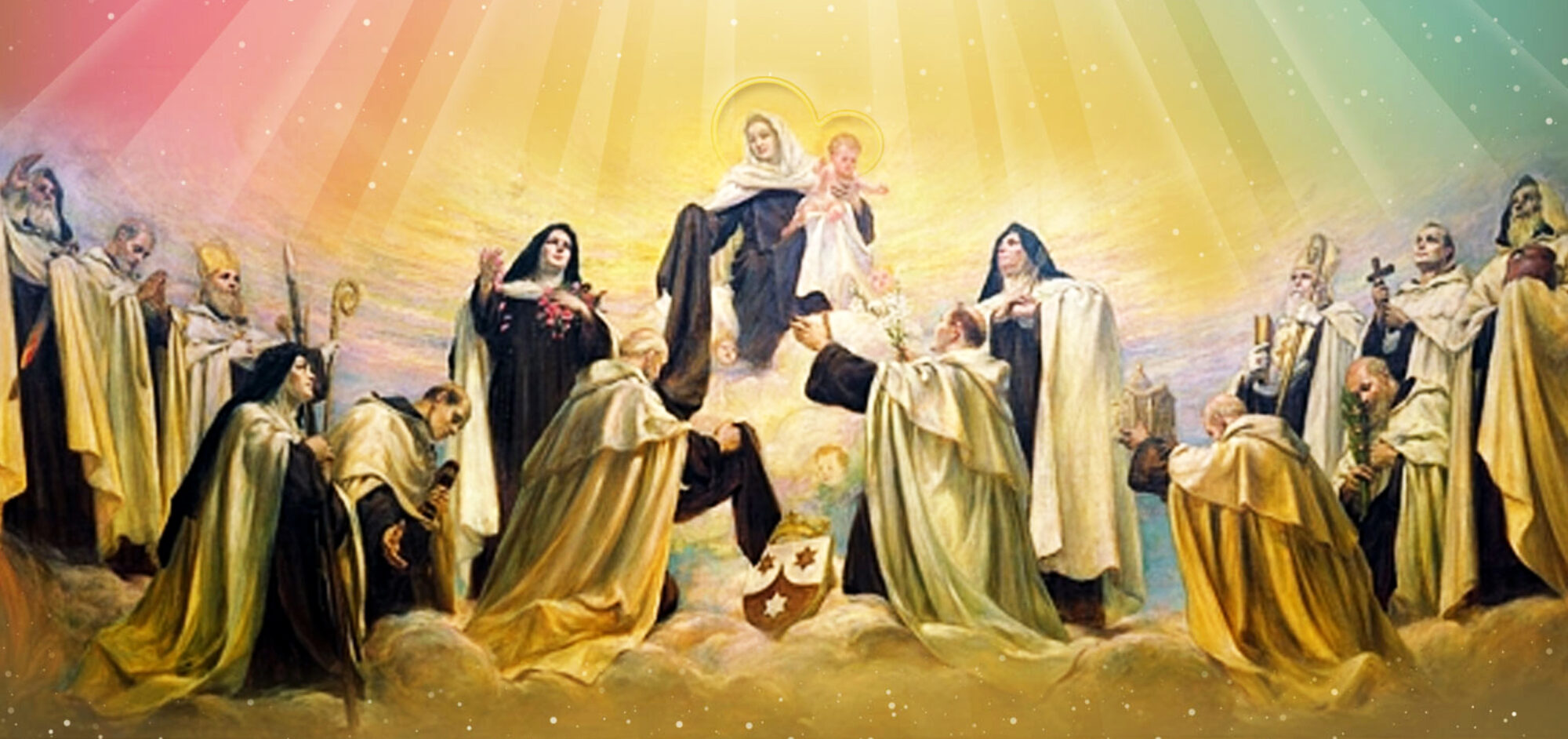
Saint of the Day – June 12 – BLESSED HILARY PAWEL JANUSZEWSKI
Hilary Januszewski was born on 11 June 1907 in Krajenki (Poland) to Martin and Marianne Januszewski. He attended the college in Greblin (where his family lived from 1915), and then continued his studies at the Institute of Suchary, but had to abandon these due to economic difficulties of the family. He took up other studies and in 1927 entered the Order of Carmelites of Ancient Observance (Ocarm) taking the name Hilary and began his novitiate in Lviv, Ukraine. He studied philosophy in Krakow, then theology at the International College of Saint Albert in Rome, Italy. There he lived with Carmelites from all over the world who were concerned with how the situation in Europe was becoming increasingly complicated and how tension was rising all the time.
The young Hilary proved to be a silent and prudent man, who loved studying. People could sense in him a deep inner life and a wealth of spiritual experience, as some of his colleagues, including Prior General, Father Kilian Healy, were to indicate later on. He was ordained priest on 15 July 1934. He obtained his lectorate in theology and the prize for the best students of the Roman Academy of St. Thomas and in 1935 returned to Poland to the monastery in Cracow. On his return to Poland, he was appointed professor of Dogmatic Theology and Church History at the institute of the Polish Province in Cracow. On 1 November 1939, Fr. Eliseus Sánchez‑Paredes, Provincial, appointed him prior of the community.
World War II was to jeopardise all the hopes and projects of the young prior. On September 1, 1939, after several months of widespread international tension, Germany had declared war on Poland. It was the beginning of a terrible month in the recent history of Poland. Twenty days later, Soviet troops launched an attack from the East. A weak Polish army surrendered on both fronts at the end of that month. Poland was once again humiliated and divided. Mass deportations, destruction, the annihilation of Jewish communities followed in quick succession. The Polish clergy did not escape this persecution. A year after the invasion, the invading forces ordered the arrest of large numbers of monks and priests.
The Carmelites in Krakow were particularly hard hit: A. Urbanski, A. Wszelaki, M. Nowakowski and P. Majcher were all arrested, to be followed shortly afterwards by the prior of the community H. Januszewski, who offered to go instead of P. Konoba, who was older than him and sick. Father Januszewski acted heroically without stopping to consider the consequences of his action, guided by his conscience and his Christian and religious values, by what he considered to be his obligation as the head of a Carmelite community. He was arrested and, after some time at the Montelupi prison in Krakow and several concentration camps, he ended up at Dachau.
In April 1941 to the concentration camp of Dachau. There he was a model of prayer life, encouraging others and giving hope for a better tomorrow. Together with the other Carmelites, among whom was Blessed Titus Brandsma, they often joined in prayer.
Meanwhile in barrack 25 of the concentration camp, typhus was spreading. To help the sick, 32 priests presented themselves to the authorities. A couple of days later, Fr. Hilary Januszewski spontaneously joined the group. What he said to his friend Father Bernard Czaplinski (later the Bishop of Chelm) shortly before he set off for the hut leaves one very moved even today: “You know I won’t come out of there alive….” His apostolate lasted 21 days because, infected by typhus, he died on 25 March 1945, in prisoner cabin 25 in the Dachau concentration camp, Oberbayern, Germany. His body was still in the cabin when Allied troops liberated the camp a few days later. His body was cremated in the crematorium of Dachau. Sure enough, Father Januszewski never left Dachau alive. After 21 days serving the sick, he died of typhus. Hut 25 had become a coffin, which the Americans, who freed the Lager a few days later, found crammed with hundreds of corpses.
Fr. Hilary Januszewski was beatified by John Paul II on 13 June 1999, during his apostolic visit to Warsaw (Poland). On this occasion the Pope beatified 108 Polish martyrs of the Second World War, victims of Nazi persecution.
HIS TESTIMONY FOR US TODAY
The beatification of Father Januszewski is a source of joy and happiness for all Carmelites. The Church has considered him an intercessor and an example, a valid witness. This is an occasion for us not only to feel that joy and to celebrate it, but also to reflect upon and to think deeply about Father Januszewski’s testimony, to find in his example keys to our own way of living today.
- First of all, there is a good example in his life, of a selfless, quiet, silent life, founded upon deep prayer and service of others. Those who knew him insist that he was remarkably simple. Had it not been for his heroic death, he would probably have been forgotten, because he never stood out in extraordinary things. But with that strength that grows from a life of prayer, acting in the presence of the Lord – something very typical and genuine in Carmelite spirituality – he gave himself up for others with the same simplicity with which he lived a quiet, hard-working life. We could say that he succeeded in being faithful to his vocation in ordinary circumstances and, as a result, was also able to be just as faithful in truly extraordinary circumstances. Faithful in very little, he was faithful also in much (Lk 16:10).
- We find the experience of the concentration camps in which Father Januszewski lost his life especially cruel and inhuman. However, there are situations even now that are, in a way, very similar: racial hatred, poverty and starvation, wars of all kinds, massacres, intolerant violent nationalist movements… His testimony invites the Carmelites to make a radical option for life, which nowadays is threatened in so many ways. He was able to do this in the most sublime way, giving up his own life for that of others.
His example reminds us that Carmelites are called to vouch for life in the midst of a “culture of death”, which shows itself in many different ways, not only in those regions of the world in which that “culture of death” is more obvious, but also in other areas where its presence is more subtle. Moreover, in the face of the temptation of “usefulness”, of valuing human beings for what they produce, and eliminating those who are no longer useful and become a burden, Father Januszewski opted radically for the dying, the useless, those who apparently had nothing left to offer. With this action, he proclaimed and testified to the sacred value of human life, for itself and in itself. This witness given by Hilary Januszewski went to the ultimate limit, the giving of his own life.
- We also find in Father Januszewski an especially interesting example for our experience of the Carmelite charism today. A man of silence and prayer, accustomed “to talking to God”, he was devoted to contemplation -like any good Carmelite – had no difficulty in finding the face of Christ in the weak, the needy and the suffering. In the awful conditions of Dachau, those with typhus fever, the dying, were the poorest of the poor and he along with other priest volunteers, was willing to stay with them and end up dying with them and for them.
A life of intense prayer makes us more human and more capable of living in solidarity with others; it gives us the necessary intuition and sensitivity to discover the mysterious presence of the Lord in those who are weakest, in the midst of the tensions and contradictions of life. Like John in the boat on the Lake of Galilee, between the darkness of the passing night and the light of dawn, the Carmelite is called to proclaim, humbly but firmly: “It is the Lord” (Jn 21:7).
- Finally, the witness of Hilary Januszewski, must show Carmelites throughout the world the meaning of the international dimension of our Order. Overcoming national barriers, Father Januszewski offers us a true witness to universal fraternity, to reconciliation between enemy nations, and to peace.
May the example and intercession of Fr Hilary Januszewski help us to enter the twenty-first century with a real spirit of service, peace and justice born out of a true and intense encounter with our Risen Lord.
(Compiled by Fr Regan D’Souza, OCD from various sources)

